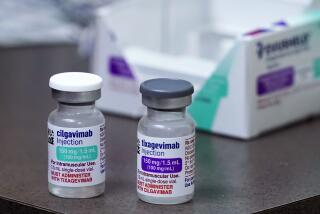FDA Moves Quickly, OKs New Drug to Fight AIDS
- Share via
WASHINGTON — Moving with unusual speed, the Food and Drug Administration on Friday announced full approval of a powerful new AIDS drug that has been shown to reduce episodes of illness and prolong the lives of very sick patients.
The licensing of ritonavir comes a scant 24 hours after an FDA advisory committee recommended that the drug be approved for use only in advanced cases of the disease.
The FDA, going beyond the committee’s advice, extended its approval to include patients in the early stages of infection. The expansion is contingent on the manufacturer’s agreement to conduct further research in this population.
“This drug provides real hope for patients with AIDS,” FDA Commissioner David A. Kessler said. “Patients will live longer.”
The drug, developed by Abbott Laboratories, is one of a new class of potent antiviral drugs called protease inhibitors, which scientists believe are many times more potent than the drugs that have been in widespread use for nearly a decade.
In other action, the advisory panel recommended that a third protease inhibitor be approved for marketing. The drug, indinavir, also known as Crixivan, made by Merck & Co., has been shown in recent research to suppress the AIDS virus to undetectable levels in patients after six months and even longer when used in combination with old-line AIDS therapies. Final FDA approval has not yet been given.
The first of this family, saquinavir, manufactured by Hoffmann-LaRoche Inc., was approved by the FDA in December.
The approval of ritonavir was the fastest approval of any AIDS drug so far--72 days--and could in fact be the fastest drug approval in FDA history. The FDA has been criticized by the Republican Congress for its sluggish pace of drug and device approval, although in recent years the agency has streamlined its procedures to speed approval of drugs for life-threatening conditions such as AIDS and cancer.
“Our national investment in AIDS research is paying off,” President Clinton said in a statement about the new drug’s approval. “Among scientists, as among many people living with HIV, despair is giving way to hope. We cannot stop now. We must recommit ourselves to finding a cure.”
*
Also on Friday, Clinton asked Congress to appropriate an additional $52 million to help AIDS patients pay for drug treatment. As the approach to treating AIDS moves toward prescribing several drugs in combination, concern has mounted over their cost. Each of these drugs can cost several thousand dollars a year.
The FDA based its approval of ritonavir on data showing that it increases CD4 immune system cells (which help fight infections), decreases the amount of virus in the bloodstream and, more important, also reduces the progression of disease and the death rates in those with advanced AIDS. In clinical studies, the drug was studied alone and in combination with nucleoside analogs, which have been the standard AIDS drugs in HIV-infected people in various stages of the disease.
Nucleoside analogs and protease inhibitors attack the virus at different stages in its reproductive cycle. The nucleoside analogs hit the replication process early on, while protease inhibitors target a critical later phase.
Each ritonavir trial examined CD4 changes and the amounts of detectable virus.
The largest of the studies also looked at death rates in the sickest patients. The cumulative mortality rate among participants on the drug was about 40% of that in a control group taking a placebo. Those on ritonavir also experienced a 50% greater reduction in disease progression, suffering far fewer episodes of illness, during the six months of the study.
Ritonavir, which will be marketed under the name Norvir, will be available within two weeks. Its price has not yet been determined.
Studies on indinavir, the other drug that was recommended for approval by the advisory panel Friday, showed that the human immunodeficiency virus could not be found in the blood of 90% of the patients who took a combination of indinavir, AZT and 3TC.
This did not mean that viral replication was halted entirely, but it was slowed to levels that could not be measured by the most widely used testing methods.
The findings have bolstered hopes that powerful drug combinations can suppress or slow reproduction enough to delay or halt the development of drug-resistant viral strains.
As long as the virus has the ability to replicate, it can produce mutant strains, making drug resistance inevitable and rendering drug therapy ineffective.
Kessler said the FDA is working with the manufacturer of indinavir to make sure that when the drug finally is given approval, the manufacturer will be able to deliver ample supplies to the marketplace.
More to Read
Sign up for Essential California
The most important California stories and recommendations in your inbox every morning.
You may occasionally receive promotional content from the Los Angeles Times.










